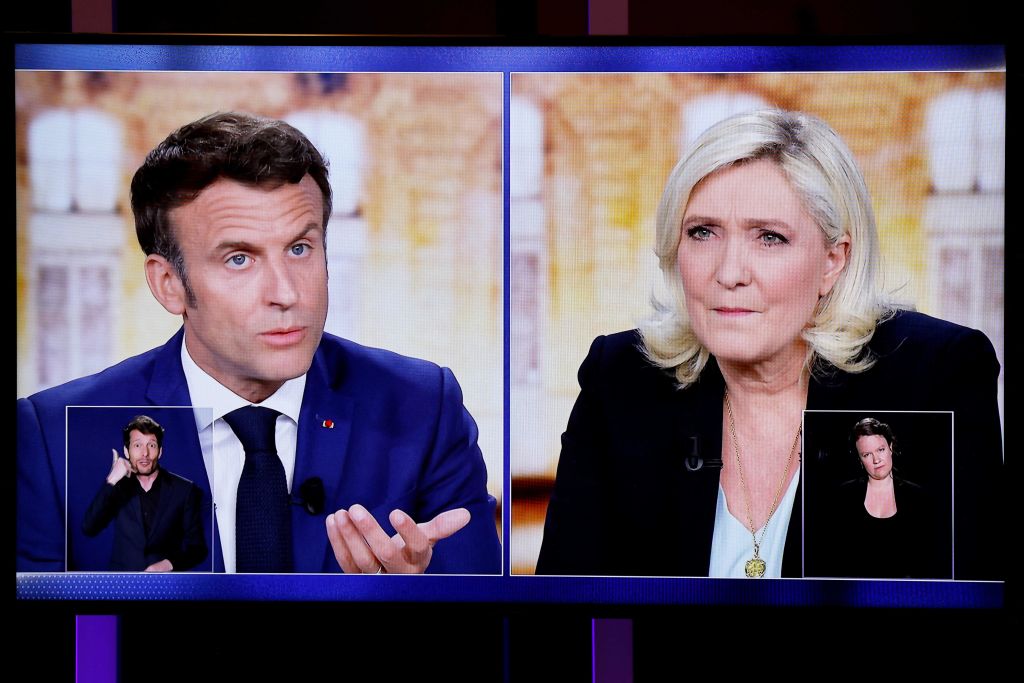Will Le Pen sway France in second tilt against Macron?

Five years ago, when Marine Le Pen faced Emmanuel Macron in the televised debate ahead of the second round of the French presidential election, she flunked the test. Taking an overly aggressive tone from the start, she was clearly out of her depth on economic issues, fecklessly flipping through her notes. In front of more than 16 million viewers, she lost 30,000 votes a minute over the course of the 2.5-hour debate, ceding 6% of the support she had when the day began. A few days later, Macron won the election in a landslide, 66% to 34%.
Le Pen was back for a rematch on Wednesday, in a much stronger position than she was five years ago, with polls giving her 45% support—although the dynamic seems to be in Macron’s favour. She has learned from her mistakes by ‘de-demonising’ her party. She had already kicked out her father, Jean-Marie Le Pen, for Holocaust denial, and in 2018 she renamed the confrontational-sounding National Front (Front National) the National Rally (Rassemblement National), which has a more inclusive air and gives a nod to Rally of the French People (Le Rassemblement du peuple français), the movement Charles de Gaulle led after World War II.
Le Pen softened her image too, appearing with her cats on Instagram and even taking selfies with teenagers—some of them veiled. She has spoken about how difficult it was growing up in the Le Pen household and the fractious relations she has with her father and her niece, Marion Maréchal, who backed the far-right neophyte Éric Zemmour’s campaign in the first round. Le Pen also touted her experiences as a single mother. She even managed to use her humiliation during the 2017 debate to her advantage, connecting it to the everyday slights people suffer and spinning her rebound in this year’s campaign as an inspiring tale of hope prevailing over despair.
In this, she was helped by Zemmour, whose nastiness made her appear more moderate and unifying—an important component of a campaign strategy based on portraying Macron as the candidate who has divided France. She’s toned down some of her policies, too, notably abandoning her proposed referendum on leaving the euro, which in 2017 scared off older voters, who feared for their pensions, and also on the question of the death penalty, which she claims she no longer wants to restore.
So far, it’s been working: Only half of the French population now see Le Pen as a threat to their society. Many younger voters have been attracted to her proposal to exempt those under 30 from taxation, or to lower the value-added tax on gas and petrol to 5.5%—an immensely popular proposal in a country facing a cost-of-living crisis, like much of the rest of the world, owing in part to the war in Ukraine. Most French people no longer seem to believe she will be able to implement her harsher proposals on immigration or even the veil, which she wants to ban. French youth in the northern Paris suburb of Saint-Denis, one of the most ethnically diverse areas of the country, didn’t believe she would implement the veil ban because she ‘isn’t as bad as everyone says’.
But is the mask starting to slip? With the media spotlight in the second round focusing on her program instead of her personality, the things that haven’t changed since 2017 have come more clearly into view. That includes her proposal to insert a ‘national preference’ clause into the constitution, thereby guaranteeing that native French would have priority over all others when applying for jobs, social housing and other services.
After qualifying for the runoff with Macron, she also announced—in the midst of the Ukraine war—that France should seek a closer alliance with Russia and leave NATO’s integrated military command. And although she claims no longer to want to leave the EU, but rather to reform it ‘from within’, her European policy has been described by commentators as a ‘Frexit in all but name’. Even on a personal level, Le Pen has become tetchier with journalists and last week a protester was dragged out of one of her campaign rallies.
So, how did the debate go?
Its mostly technocratic—and cordial—character, focusing on macroeconomic matters, played to Le Pen’s normalisation. And while she seemed uncertain and hesitant on some issues, it was nothing like last time. Macron started strongly, getting the better of Le Pen on questions of the cost of living, and he was able to score points on her links with Russian President Vladimir Putin, particularly the financial ones, and her position on Europe. He consistently offered solutions to problems that Le Pen seemed happy just to raise, highlighting his competence, but he struggled to dispel his reputation for arrogance.
Things threatened to change when the question of the veil was raised. Le Pen repeated her prohibitionist position, and Macron accused her of fomenting civil war. But mostly the mask remained in place, and she seemed to be able to channel French popular anger. If anything, the debate staged two ‘normal’ candidates promoting their respective programs, however incoherent Le Pen’s is.
We will know on Sunday, after the vote, whether Le Pen’s mask slipped any further. But what already seems certain is that she has made herself politically attractive to more voters than ever before. Win or lose, she and her party are not going away anytime soon.